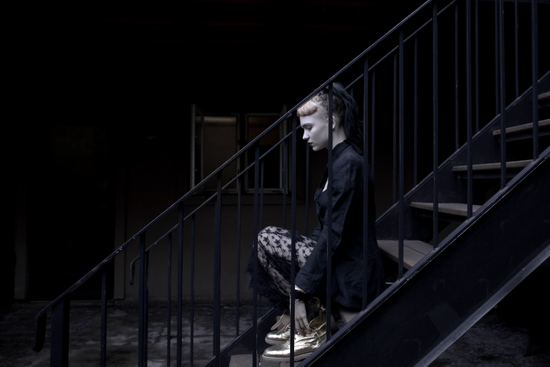Chances are, if you’ve been following the usual online rags recently, you will have heard the name Grimes. Claire Boucher released her third album, Visions, through 4AD in February, and since then her rise has been steady but inexorable. Nestling the elfin Canadian’s improbably sweet falsetto in a bed of muscular machine beats and coruscating synthetic reverbs, the album is Boucher’s most refined and ambitious musical statement yet. The impression is of a star who’s still a fair way off hitting her zenith.
Furthermore, it looks like Grimes is just the tip of the iceberg. Visions is only the most visible missive to emerge from Montreal’s (literally) frostbitten underground: artists like Purity Ring (who recently signed to 4AD) and D’eon (whose album LP is due shortly on Hippos In Tanks) have their own takes on what you could call the new Montreal sound: a brightly deranged fusion of pop sensibility and electro abstraction, often sugary but equally unsettling, on one level easily digestible but on another incorrigibly weird. It’s an intriguing proposition, yes, but also one with undeniable mass appeal. You’d do well to keep a close eye on this lot.
The Quietus caught up with Boucher via Skype ahead of a show in Malmö – the latest instalment in a seemingly endless tour that has seen her travel the length and breadth of the Western world (and will reach its peak with a train-bound tour of Canada supporting Skrillex and Diplo in July). Next week, that tour will take her to Field Day, where she’ll be performing on the Quietus Village Mentality stage. With any luck, we’ll get a few topless dancers thrown in for free. [have you seen John and Luke without their shirts on? – ED]
I wanted to ask about the live show. In videos I’ve seen from a little while ago it’s just you on stage, having to handle all your gear and sing at the same time – it looks kind of stressful. Is that still the way you’re working, or have you brought more people on board?
CB: It really depends, it’s usually different people in every city – whoever’s around to help me out. But if you’re watching any old videos it probably sucks – I used to suck live.
Really?
CB: Yeah! [laughs] Well I was just so nervous.
So, before becoming Grimes had you not performed all that much?
CB: Oh god, never. Even until like one or two months ago I couldn’t play a show without totally losing it.
But you still wanted to do it, you weren’t put off?
CB: Well, I didn’t really have a choice…but it’s been good now, now that I’ve been forced to do it. It’s good to do things you don’t want to do, I think.
Would you ever consider doing the Beatles move – making Grimes solely a studio project? Or do you think the live aspect is important?
CB: Oh, I’d completely die and go to heaven if I could do that. But I think it’s a different world now. You need to make a living… I don’t know. But even more than that, I think it’s a good thing to do, I do enjoy playing live. Maybe if it wasn’t like every day – I actually haven’t been home since August. It’d be better if it wasn’t this intense. But I don’t think it’ll always be this intense, it’s just right now we’re kind of… and it’s really hard to say no to things. We get really cool show offers and I just can’t say no – like, if I’ve never been to a particular country then I probably want to play there, stuff like that.
I heard you had choreographed dancers at a show recently?
CB: Oh – not choreographed… I usually like to get people in because I don’t have a band or anything. In cities where I have friends, I try to get them to come out and dance for me.
In the past you’ve talked about your admiration for big R&B stars, people like Beyonce. Her show involves costume changes, pyrotechnics, the works – do you view your gigs in that way, as a spectacle? Do you aspire to that kind of show?
CB: Yeah, but… Well, first of all my budget isn’t huge. But even though I really admire what Beyonce does, and she’s probably got one of the best live shows in the world right now – honestly! – that’s so not my style. I don’t know if I would ever have costume changes – usually I just end up taking off my shoes, I get so sweaty, and… I just need to be comfortable. Because I grew up going to punk shows, that kind of thing – I don’t wanna make pop punk! – but I like the idea of people going totally crazy and it being really intimate, loud and super-aggressive, but combining that with pop music. Lately I’ve been really into screaming a lot through delay [effects], having seven people on stage topless going crazy, stuff like that. Really in your face, but maybe more organic than choreographed dance moves, that kind of thing…
Talking about that pop sensibility – on your records, is accessibility a big consideration? When you’re making music, do you think ‘is this poppy enough’?
CB: The last thing I think about when I’m making music is its reception. Usually when I make music, in my head I’m like ‘this isn’t Grimes, this is just some other project that you can release later, so there’s no pressure and it doesn’t matter and no-one’s ever gonna hear it’. Because if I don’t do that, if I think about what other people are thinking when I’m making music, I just can’t do it. It’s too withheld – I need to go totally over the top, and then kind of clean it up a bit and make it more reasonable after the fact.
So I don’t think about being accessible or not being accessible, but it’s really important for me that it just feels good. When I’m making something I need it to be catchy – I need it to hit the sweet spot. Whenever I’m making music I’m always waiting for the shivers to happen – that’s an important thing for me. And I love pop music, but I also love noise music, IDM – anything really, I get something out of most kinds of music. I just need to enjoy the process. I think you can hear, when you listen to someone’s music, whether or not they’re enjoying making it – it’s so great to hear music where you can tell the person making it was just having a blast. That’s really important to me as far as my process goes. That’s probably why my music ends up being so poppy!
I heard that when you made Visions you were locked inside for days, you didn’t really go outside. Is that true?
CB: Yeah, I locked myself in my room for three weeks. I usually do that though.
So that’s just your lifestyle, not a conscious plan?
CB: Yeah. I mean it takes me probably about four hours to get into the groove [with making music]. And it’s really important for me to not break the groove. And the groove can go for like three days – once I’m in it it will just keep going until I’m totally exhausted. But that’s how I like to work, I like to be away from everyone and just get in the zone, and stay there for as long as I can keep it there.
Would you say you thrive off quite intense states? Could you not see yourself going into a studio at ten in the morning, leaving at six, going home and chilling out for the evening?
CB: Oh, that would be horrible. First of all, I only work at night, generally. Usually when I work [during the day] I’ll black out the windows or something. But I would never go to a studio. I need my space, you know what I mean? I need to be able to chain smoke and pace about, cry and like… spit. Just make noise, make a huge mess. I also feel like if I was concerned for the cost of the studio – like, ‘this is costing 40 dollars an hour’ – I wouldn’t be able to work.
Did the reputation and history of 4AD change the music you were making for the album?
CB: No. Actually, the main reason I went with 4AD is they were pretty much the only people who weren’t asking me to change stuff. I mean they are like, ‘Claire, you should probably go into a studio’, but they’re not gonna make me go in a studio. They pretty much let me do whatever I want. And everyone else that we talked to said, ‘we can get you working with a real producer!’, stuff like that. Like, ‘what the fuck are you talking about, I am a producer!?’ [laughs] So 4AD pretty much let me do whatever I want – they’re even letting me choose the release date for my next album.

When I listen to Visions I definitely hear the classic 4AD sound in there. Was there a stylistic reason for choosing to work with them?
CB: Well I actually finished the record before I even spoke with them – and they saw me play live before they heard the record. But definitely, I’ve been listening to the Cocteau Twins since I was probably 14 years old. Another big thing about 4AD is, as a label, I’m very into their roster. I think they have great taste. There aren’t many other labels who I can say are that successful, and can give me as much as 4AD gives me, and still have such a great roster. Especially with Purity Ring… When I signed with 4AD I kinda knew that Purity Ring was gonna sign with them too [laughs], so that was part of it too.
I wanted to ask about the Montreal scene and how that’s influenced you. Do you think your music is distinctively from or ‘of’ that scene?
CB: I think so. I think Canadian music – especially in Montreal, songwriting is really important, but everyone makes electronic music. I guess that’s what’s really distinctive about bands like Purity Ring and Grimes, or Blue Hawaii, Mozart’s Sister… It’s electronic music and it has those pop-dance elements but I think the songwriting is really strong across the board. And that’s not something you see so much in blog music these days. I know texture is really important, but I think texture and stuff precedes songwriting a lot of the time these days.
But even beyond that, it’s just really really cheap here and there’s tons of illegal venues, so you can play all the time, anywhere. I think one of the reasons I’m successful as a musician is that the first like 30 shows I played, I played with no monitors standing in front of guitar amps in a shitty, smoky warehouse where people were screaming and wasted, knocking over my gear. So shows after that seem pretty easy!
Would you ever move anywhere else, or do you consider Montreal your spiritual home?
CB: Oh I am done with Montreal, I can tell you that much. I love the city but it is so fucking cold. I got frostbite last year, and I almost lost my toes. I’m done with the north! I’m gonna move to Mexico or something [laughs]. I’ve never lived outside of Canada, so I’ve been really cold my entire life. Most of my memories are coloured by the fact that I was really cold, just… all the time! [laughs]
People say your music sounds cold. Do you think there’s a link there?
CB: I think my music’s kind of cold, but I don’t know if it’s related to the weather. It might be because it’s always grey [in Montreal], it’s very depressing. I write music better in the winter, I prefer making music when it’s dark. I also think Canadians make a lot of music because we’re stuck inside all the time. And another thing with Montreal is it’s so cold and everyone’s so poor and beer’s so cheap: if you go to a show you have to brave the weather to get there. So you show up and everyone’s soaking wet – there’s a sense of ‘I trekked through three feet of snow to get here!’ I think there’s a kind of camaraderie that arises out of that, that’s important to me as well.
But you’re done with the place now?
CB: I just can’t do it! My feet now, whenever it’s below zero they just go completely numb. They’re really fucked up I think.
Grimes plays the Quietus Village Mentality Stage at Field Day 2012. For tickets and more information, go here



